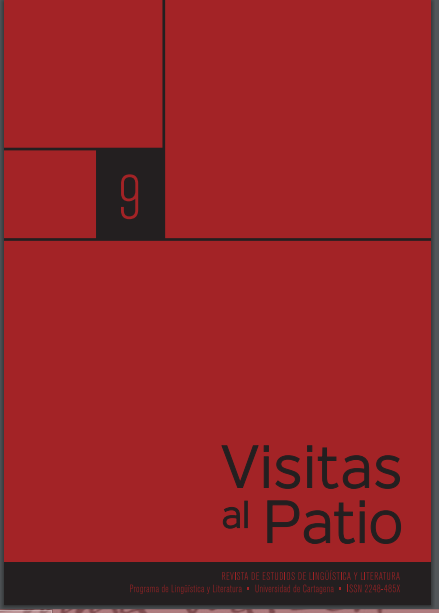Autobiografía de mi madre, de Jamaica Kincaid: alegoría y auto-escritura como contra-discurso
Autobiografía de mi madre, de Jamaica Kincaid: alegoría y auto-escritura como contra-discurso
Contenido principal del artículo
Resumen
Descargas
Datos de publicación
Perfil evaluadores/as N/D
Declaraciones de autoría
- Sociedad académica
- Universidad de Cartagena
- Editorial
- Universidad de Cartagena
Detalles del artículo
Referencias (VER)
Boehmer, E. (1992). Stories of Women and Mothers: Gender and Nationalism in the Early Fiction of Flora Nwapa. En S. Nasta (Ed.), Motherlands: Black Women’s Writing from Africa, the Caribbean and South Asia (3-23). New Brunswick, New Jersey: Rutgers University Press.
Cudjoe, S. R. (1990). Jamaica Kincaid and the Modernist Project: An Interview. En S. Cudjoe (Ed.). Caribbean Women Writers: Essays from the First International Conference. Wellesley: Calaloux.
Donnell, A. (1999). When Writing the Other is Being True to the Self: Jamaica Kincaid’s The Autobiography of My Mother. En P. Polkey. (Ed.), Women’s Lives Into Print: The Theory, Practice and Writing of Feminist Autobiography. New York: St Martin’s, pp. 123-136.
Donnelly, M. (1995). Mother Country, Father Country: In the Castle of My Skin and Oedipal Structures of Colonialism. Ariel 26 (4), pp. 7-20.
Eleanor Wachtel with Jamaica Kincaid [Interview by E. Wachtel]. (1996, Fall). The Malahat Review: 55-71.
Fanon, F. (1963). The Wretched of the Earth. New York: Grove.
Ferguson, M. (1994). A Lot of Memory: An Interview with Jamaica Kincaid.The Kenyon Review 16 (1): 63-188.
Gilroy, P. (1993). The Black Atlantic: Modernity and Double Consciousness. Cambridge: Harvard UP.
Gregg, V. M. (2002). How Jamaica Kincaid Writes the Autobiography of her Mother. Callaloo 25 ( 3): 920 - 937.
Halsall, P. (1999). Voltaire: Patrie, in The Philosophical Dictionary, 1752 (Modern History Sourcebook) Recuperado del sitio en internet de Fordham University, Modern History Sourcebook: http://www.fordham.edu/halsall/mod/1752voltaire.html
Hegel, G. W. F. (1956). The Philosophy of History. New York: Dover.
Hirsch, M. (1990). Maternal Narratives: Cruel Enough to Stop the Blood. En H. L. Gates (Ed.), Reading Black, Reading Feminist: A Critical Anthology (415-30). New York: Meridian.
JanMohamed, A. R. (1985). The Economy of Manichean Allegory: The Function of Racial Difference in Colonialist Literature. Critical Inquiry 12: 59-87.
Kincaid, J. (1986). Annie John. New York: Plume.
Kincaid, J. (1991). Lucy. New York: Plume.
Kincaid, J. (1992). At the Bottom of the River. New York: Plume.
Kincaid, J. (1994). Where the Land meets the Body. Charlottesville: UP of Virginia.
Kincaid, J. (1997). The Autobiography of My Mother. New York: Plume.
Lewis, L. (2000). Nationalism and Caribbean Masculinity. En T. Mayer. (Ed.). Gender Ironies of Nationalism: Sexing the Nation (261-81).
London: Routledge. McClintock, A. (1995). Imperial Leather: Race, Gender and Sexuality in the Colonial Contest. New York: Routledge.
McClintock, A. (1997). “No Longer in a Future Heaven”: Gender, Race, and Nationalism. En A. McClintock, A. Mufti & E. Shohat (Eds.), Dangerous Liaisons: Gender, Nation and Postcolonial Perspective ( 89-112).Minneapolis: University of Minnesota Press.
Morris, A., & Dunn, M. (1992). The Bloodstream of Our Inheritance: Female Identity and the Caribbean Mothers-land. En S. Nasta (Ed.), Motherlands: Black Women’s Writing from Africa, the Caribbean and South Asia (219-37). New Brunswick, New Jersey: Rutgers University Press.
Paquet, S. (2002). Caribbean Autobiography: Cultural Identity and SelfRepresentation. Madison: University of Wisconsin Press.
Rooney, Caroline. (1999). “Dangerous Knowledge” and the Poetics of Survival: A Reading of Our Sister Killjoy and A Question of Power.
En S. Nasta (Ed.), Motherlands: Black Women’s Writing from
Africa, the Caribbean and South Asia (99-126). New Brunswick, New Jersey: Rutgers University Press.
Schultheis, A. (Invierno de 2001). Family Matters in Jamaica Kincaid’s The Autobiography of My Mother. Jouvert, 5(2). Recuperado de http://social.chass.ncsu.edu/jouvert/v5i2/kincai.htm
Slemon, S. (1987). Monuments of Empire: Allegory/Counter-Discourse/Post-Colonial Writing. Kunapipi 9 (3), 1-16.
Slemon, S. (1988). Post-Colonial Allegory and the Transformation of History.Journal of Commonwealth Literature 23 (1), 157-68.
Sosnoski, K. (1997). Autobiography. En E. Kowaleski-Wallace. (Ed.).Encyclopaedia of Feminist Literary Theory (30-31). New York: Garland.
Tiffin, H. (1989). Rites of Resistance: Counter-Discourse and West Indian Biography. Journal of West Indian Literature 3(1): 28-46.
Eleanor Wachtel with Jamaica Kincaid [Interview by E. Wachtel]. (1996, Fall). The Malahat Review, 55-71.



 PDF
PDF
 FLIP
FLIP





